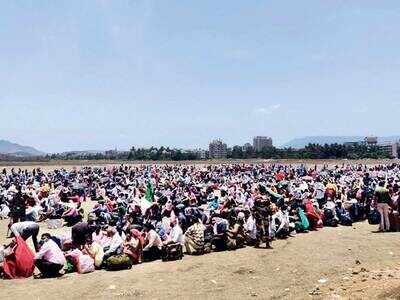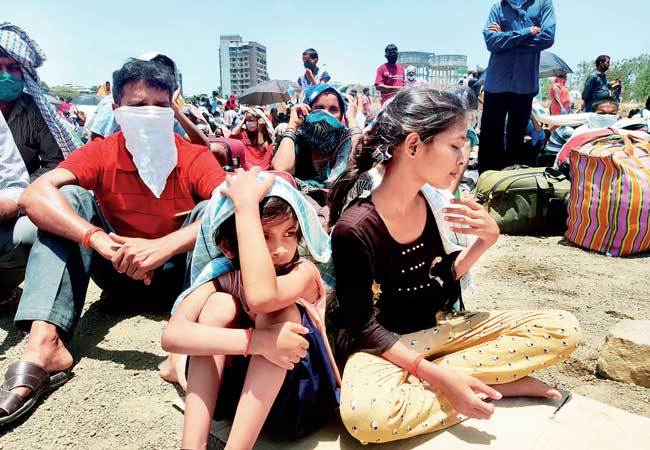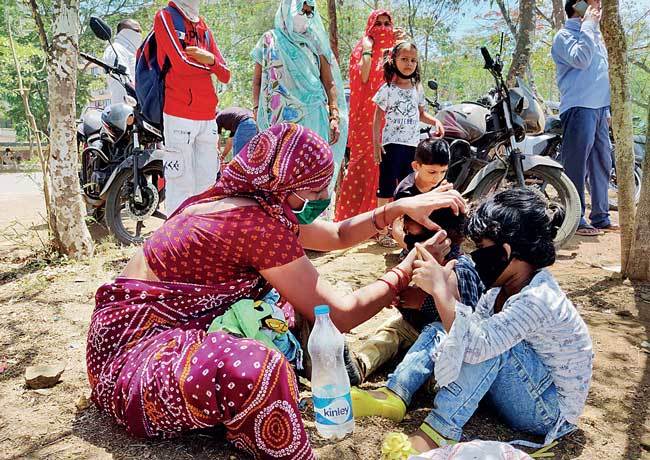
The promise of tomorrow
by Mumbai MirrorBy Parth MN
Thousands of migrant workers wait at Vasai land to board trains; many have given up rented accommodations and have nowhere to go
A 70-acre salt pan in Vasai has become a symbol of hope, desperation, agony and ecstasy.
Since the shramik trains started on May 1, migrant workers have been gathering each day at the Suncity ground, waiting to be ‘chosen’. So far, 17 trains have left for different north Indian states from Vasai, but the crowd size only seems to be swelling.
To board these trains, the workers have to submit their travel application forms to a local police station and then wait to be called. The waiting period can wear down the toughest resolve—people who are able to find alternative modes of transport, even those that entail the biggest risks, leave. “To fill the seats of those who have left for their homes, we allow workers without registration to board a train,” said Swapnil Tangade, sub-divisional officer of Vasai.

“We make a list of 1,600 workers, and if only 1,200 turn up, we let 400 through on a first-come-firstserve basis.”
But the authorities have failed to gauge the scale of the humanitarian crisis. For those few hundred seats, thousands of desperate workers from and around Vasai have been converging on the ground.
For many, like Satish Yadav, there is no turning back. Yadav arrived on the midnight of May 21, hoping to go back to his village in Uttar Pradesh’s Jaunpur district. He spent the night under the open sky with his wife and two daughters—aged five and nine. “We were told there is a train to Jaunpur today,” he said on May 22, sitting in blistering heat, while his daughters covered their head with a towel to protect themselves from the sun. “The police told us there is only one train leaving today, and that too for Gorakhpur. We have not eaten anything since morning. My daughters had a few biscuits. That’s all.”
A few migrant workers claimed that they had arrived the day before to enquire about a train to Jaunpur when the police asked them to “come tomorrow”. The word of mouth spread quickly, and hundreds of workers arrived at the ground with hurriedly packed bags. The day that began with hope ended in fresh pangs of grief and envy as only some made it to the trains.
Yadav said he and his family “will stay here till we get a train” since they had given up their rented house in Nallasopara before heading for the ground.
But that isn’t easy. Once the trains leave for the day, police officers force migrant workers to vacate the ground. Many pretend to leave, hide in the trees and grass around the ground, and come back when the policemen go.

Akhilesh Rai, an activist with a local NGO Samadhan Foundation, has been providing dinner to these workers late in the night. “They come out when we reach with food,” he said. “After having dinner, they get back to wherever they feel confident of not being caught by the police. By sleeping around the ground, it gets easier for them to queue up first thing in the morning.”
But this arrangement leaves the workers at the mercy of charity for their meals.
Besides, the ground has only one mobile toilet, which makes it particularly difficult for women. Kusum Gupta, 30, who arrived at the ground at 6 am with her husband and two children aged three and four, said there is a stream nearby where most women go to relieve themselves. “What can we do?” she said. “There is a security concern but there are hardly any facilities available for us.”
Gupta, whose husband was a former labourer, has been out of work since the lockdown began. They have little money left. “The autorickshaw driver charged us Rs 500 to get here from Nallasopara,” she said. “We spent that much because we thought we were heading home. We have luggage and children. We cannot walk back. Hiring an autorickshaw will mean Rs 1,000 wasted in a day. We will wait here instead. Let’s see if we get the train tomorrow.”